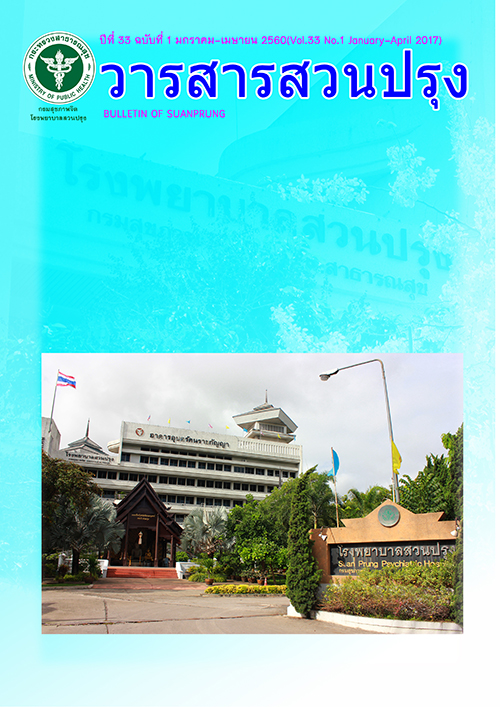พุทธจริยศาสตร์กับการแสดงเจตนาปฏิเสธยืดการตายในวาระสุดท้ายของชีวิต;Buddhist Ethics and the Intention of Withdrawing Life-prolonging Treatment Represented in the Living Will
Main Article Content
Abstract
บทคัดย่อ
วัตถุประสงค์ ศึกษาพุทธจริยศาสตร์กับประเด็นปัญหาการแสดงเจตนาปฏิเสธยืดการตายในวาระสุดท้ายของชีวิตตน
วัสดุและวิธีการ การวิจัยเชิงเอกสาร (Documentary Research) โดยรวบรวมข้อมูลชั้น ปฐมภูมิ (Primary Sources) พ.ร.บ.สุขภาพแห่งชาติ พ.ศ.2550 พระไตรปิฎก อรรถกถา และรวบรวมข้อมูลชั้นทุติยภูมิ (Secondary Sources) จากหนังสือ ตำรา เอกสารทางวิชาการ งานวิจัยทั้งในประเทศและต่างประเทศ รวมถึงการสัมภาษณ์เชิงลึก (In-depth interviews) และทัศนะของผู้ให้บริการ ผู้ป่วย ญาติผู้ป่วยผู้นำทางศาสนา นักวิชาการ รวม 15 รูป/คน
ผล พบว่าพุทธจริยศาสตร์เป็นแนวทางความประพฤติของคนที่อยู่ร่วมกันในสังคม มีการแบ่งเกณฑ์ การตัดสินความประพฤติเป็นฝ่ายกุศล และฝ่ายอกุศล ซึ่งพิจารณาถึงความดี ความชั่ว ความถูกต้อง และความผิด สำหรับการสัมภาษณ์เชิงลึก พบว่า มีผู้เห็นด้วยกับการแสดงเจตนา จำนวน 11 รูป/คน โดยให้เหตุผลว่า ไม่กระทบต่อพุทธจริยศาสตร์ เพราะการแสดงเจตนานั้นเป็นเรื่องส่วนบุคคล มีการคิด การตัดสินใจด้วยตนเอง ไม่ได้มีการบังคับ ทั้งยังแสดงถึงศักดิ์ศรีความเป็นมนุษย์อย่างแท้จริง การดำเนินการดังกล่าวไม่มีความผิด และมีผู้ไม่เห็นด้วยกับการแสดงเจตนา จำนวน 4 รูป /คน โดยให้เหตุผลว่า การแสดงเจตนาที่มีความประสงค์ต้องการให้ตนเองตาย หรือญาติมีเจตนาต้องการให้ผู้ป่วยตาย เมื่อแพทย์ปฏิบัติตามเจตนาและผู้ป่วยตายสมเจตนา ถือเป็นเรื่องผิดขัดต่อแนวทางของพุทธจริยศาสตร์
สรุปผล ผลกระทบทางพุทธจริยศาสตร์กับการตายในวาระสุดท้ายของชีวิตขึ้นอยู่กับเจตนาที่แสดงออกมาของผู้กระทำ
คำสำคัญ พุทธจริยศาสตร์, การแสดงเจตนา, ปฏิเสธยืดการตาย, วาระสุดท้ายของชีวิต
*นิสิตหลักสูตรพุทธศาสตรดุษฎีบัณฑิต บัณฑิตวิทยาลัย มหาวิทยาลัยมหาจุฬาลงกรณราชวิทยาลัย, Email : tw.2522@hotmail.com
Buddhist Ethics and the Intention of Withdrawing Life-prolonging Treatment Represented in the Living Will
Abstract
Objective: To study Buddhist ethics and the intention of withdrawing life-prolonging treatment represented in the living will.
Materials and Methods:This was a documentary research conducted by collecting primary data from the Nation Health Act in 2550 B C., tipitaka and attakata, and secondary data collected from textbooks, texts, academic papers and related research both in Thai and foreign languages.In addition, in-depth interviews and fifteen point of views by physicians, patients, patient’s family, guru in Buddhism and scholars were also included.
Results: It was found that the Buddhist ethics are a guideline of social rules for human’s behavior. In accordance with the rule of good behavior or bad behavior confirm by goodness or badness and justice or unjustice .The results of the in-depth interviews revealed that there were eleven agreements regarding to the intention. As a consequence, Buddhist Ethics have no effect, because the expression of a personal intention is a basis of human right, anyone has the right to make decisions. And a person has the right to self-determination, no one can have control over it. It is also, an expression of the intention of an honor in humanity, so it is not illegal.Other point of view, there were four disagreements regarding to the intention. As a consequence, any intention to die ,regardless of coming from the patient or a family member, is considered immoral according to the Buddhist Ethics
Summary: An effect of Buddhist ethics according to the living will depends on the intention representation of an actor.
Keywords: Buddhist ethics, Intention representation, Withdrawing life–prolonging treatment, Living will
Article Details
บทความหลังผ่านการปรับแก้จากกองบรรณาธิการแล้ว เป็นลิขสิทธ์ของวารสารจิตเวชวิทยาสาร โรงพยาบาลสวนปรุง กรมสุขภาพจิต กระทรวงสาธารณสุข ห้ามเผยแพร่เพื่อประโยชน์ทางการค้าโดยไม่ได้รับอนุญาต แต่อนุญาตให้เผยแพร่บทความดังกล่าวเพื่อประโยชน์ทางการศึกษาแก่ประชาชนทั่วไป ทั้งนี้กองบรรณาธิการไม่จำเป็นต้องเห็นด้วยกับบทความหรือข้อคิดเห็นใดๆ ที่ปรากฏในวารสารสวนปรุง

